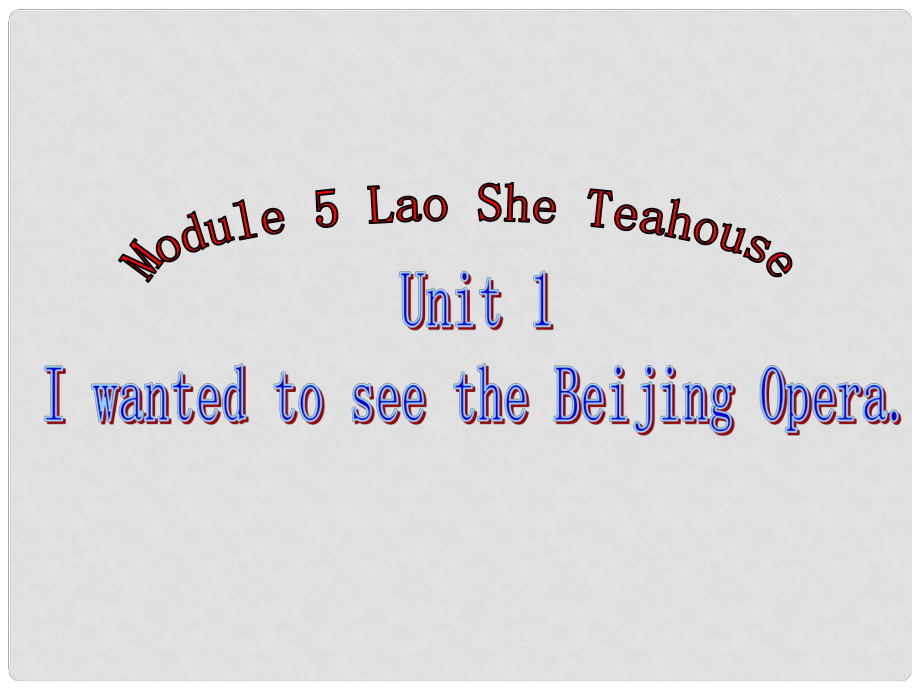《八年級(jí)英語(yǔ)上冊(cè) Module 5 Lao She Teahouse Unit 1 I wanted to see the Beijing Opera課件 (新版)外研版》由會(huì)員分享�����,可在線閱讀��,更多相關(guān)《八年級(jí)英語(yǔ)上冊(cè) Module 5 Lao She Teahouse Unit 1 I wanted to see the Beijing Opera課件 (新版)外研版(32頁(yè)珍藏版)》請(qǐng)?jiān)谘b配圖網(wǎng)上搜索�����。
1、actress /ktrs/ teahouse /ti:haus /offer /f / end /end/ in the end no idea showcommon twentieth n. 女演員女演員 n. (尤指亞洲尤指亞洲)的茶館的茶館 v. 提議����;提出提議;提出 n. (時(shí)間的時(shí)間的)最后一段��、最后一段���、 末尾末尾最后;終于最后�;終于不知道不知道展示展示普通的普通的,一般的一般的第二十第二十describesocietyhead teachercollegenovelnameifmagicv. 描寫(xiě),描繪描寫(xiě)�,描繪 n. 社會(huì)社會(huì) 校長(zhǎng)校長(zhǎng) n. 大學(xué),學(xué)院大學(xué)����,學(xué)院 n. 長(zhǎng)篇
2、小說(shuō)長(zhǎng)篇小說(shuō)v.給命名給命名如果如果魔術(shù)的魔術(shù)的 I have a plan. I plan to take my son to the countryside. I decide to climb the mountains. I want to have a picnic in the park. My husband agrees to see a film with me in the afternoon. I hope to have a good time.Sunday is coming.What do you plan to go?Where do you decide to
3���、go?What do you want to do?What do your parents agree to do?What do you hope to do?老舍老舍1. What do you know about Lao She?Talk about the following 3 questions:Lao She is a great writer of novels and plays. 2.Have you ever heard about his play Teahouse?Talk about the following 3 questions:Yes.Teahouse
4��、is one of the most famous plays of Lao She.話劇話劇茶館茶館Lao She TeahouseAccording to the play, people built Lao She Teahouse in Beijing. Its also very famous.Outside of the teahouseAccording to the play, people built Lao She Teahouse in Beijing. Its also very famous.inside of Lao She Teahouse Its very tr
5��、aditional.3. What do you think people can do in Lao She Teahouse?Talk about the following 3 questions:drink teaeat delicious foodwatch traditional music or magic showwatch Beijing Operathe Beijing Opera Beijing Opera Show in Lao Shes Teahouse The actors and actresses are excellent.actress actor Its
6�����、difficult to understand the words.1 Work in pairs. Look at the pictures and talk about them. Use the words in the box to help you. actress dance music play sing teahouse theatre traditional 2 Listen and underline the correct words or expressions. 1 Betty often sees / wants to see the traditional Bei
7�、jing Opera. 2 Betty knows / doesnt know Lao She Teahouse. 3 Lingling says that the opera is easy / difficult to understand.How was it?You know,Thats the main thing.No idea.Now check () the true sentences.1.Tony went to Lao She Teahouse with Betty and Lingling.2. Betty understood the opera.3. Linglin
8、g and Betty stayed longer than they planned.4. Betty enjoyed the opera.5. Betty would like to see the Beijing Opera again.6. Betty knew about Lao She before she went to the house.actress difficult end main offer 4 Complete the passage with the correct form of the words in the box.Betty wanted to see
9���、 the Beijing Opera. So Lingling (1) _to take Betty to LaoShe Teahouse. The words of the opera were(2) _to understand, but the offered difficult actors and (3) _ were excellent.They only planned to watch for an hour, butin the (4)_, they stayed for three hours.Betty thought it was interestingthat was
10�����、the _thing! actresses end main 5 Read and predict which words in the answers the speaker is likely to stress.1. Do you want to see the Beijing Opera? Yes, Id love to.2. Do you want to come to Lao She Teahouse with me? Yes, Id like to go with you. Now listen and check.Useful expressions它怎么樣�����?它怎么樣�����?你知道你
11��、知道主要的興趣主要的興趣/東西東西提出帶我們?nèi)ツ莾禾岢鰩覀內(nèi)ツ莾嚎淳﹦】淳﹦ow was it?as you knowthe main interest/thingoffer to take us thereSee the Beijing opera盡力想聽(tīng)懂盡力想聽(tīng)懂做某事是做某事是(不不)可能的可能的計(jì)劃做某事計(jì)劃做某事喝些茶喝些茶玩得開(kāi)心玩得開(kāi)心希望做某事希望做某事try to understandIts (im)possible to do sthplan to do sthhave some teahave a good timehope to do sth下次下次不知道不知道.
12�、以以而聞名而聞名作為作為而聞名而聞名為某人所熟知為某人所熟知next time(Ive ) No idea.be famous forbe famous asbe famous to生活中我們經(jīng)常遇到生活中我們經(jīng)常遇到“我努力去理解我努力去理解”�、“決定留下來(lái)決定留下來(lái)”等表達(dá)方式�,其中等表達(dá)方式�����,其中連續(xù)連續(xù)出出現(xiàn)了兩個(gè)動(dòng)詞現(xiàn)了兩個(gè)動(dòng)詞��,這種情況下英語(yǔ)應(yīng)該如���,這種情況下英語(yǔ)應(yīng)該如何表達(dá)呢�?首先請(qǐng)看下面的例句:何表達(dá)呢�?首先請(qǐng)看下面的例句:We decided to stay for a cup of tea.我們決定留下來(lái)喝杯茶�����。我們決定留下來(lái)喝杯茶����。動(dòng)詞不定式置于謂語(yǔ)動(dòng)詞之后,作動(dòng)詞動(dòng)詞不
13����、定式置于謂語(yǔ)動(dòng)詞之后,作動(dòng)詞的賓語(yǔ)��,表明意圖的賓語(yǔ),表明意圖,希望或決定的內(nèi)容�。希望或決定的內(nèi)容。1. 動(dòng)詞不定式作賓語(yǔ)動(dòng)詞不定式作賓語(yǔ)在英語(yǔ)中�,并不是所有兩個(gè)動(dòng)詞連用時(shí)在英語(yǔ)中,并不是所有兩個(gè)動(dòng)詞連用時(shí)都采用動(dòng)詞都采用動(dòng)詞+不定式的形式���,一般來(lái)不定式的形式�,一般來(lái)說(shuō)�,說(shuō),用不定式時(shí)����,所表示的多為將來(lái)的用不定式時(shí),所表示的多為將來(lái)的行為����。行為。但是在具體使用中同學(xué)們還要注但是在具體使用中同學(xué)們還要注意記憶��,因?yàn)閯?dòng)詞不同����,對(duì)其后動(dòng)詞形意記憶,因?yàn)閯?dòng)詞不同,對(duì)其后動(dòng)詞形式的要求也就不同��。式的要求也就不同�����。常見(jiàn)的后面接常見(jiàn)的后面接“to + 動(dòng)詞原形動(dòng)詞原形”作賓語(yǔ)的動(dòng)詞作賓語(yǔ)的動(dòng)詞有有:plan,
14�、 decide, hope, want, agree, offer, try, like, love。She wanted to see some Beijing Opera .My parents offered to take us there .My parents agreed to take us.We only planned to have some tea .常見(jiàn)的后面接常見(jiàn)的后面接“to+動(dòng)詞原形動(dòng)詞原形”作作賓語(yǔ)賓語(yǔ)的的動(dòng)詞有:動(dòng)詞有:plan , decide , hope , want , agree , offer , try , like , loveI hope
15���、to understand more next time.We decided to stay for two hours .動(dòng)詞不定式動(dòng)詞不定式.1.Toms main (interesting) is music.2.Its (possible) for sally to understand Beijing Opera.3. My teacher offered (help) me with my English.4.They decided (stay) there for two hours.5.My parents agreed (take) me to the zoo last Sunday.6.You should try (remember) eight or ten words a day.7.I hope (get) good marks.8.We plan (have) some tea in the teahouse. Complete the sentences with the correct form of the given wordsinterestimpossibleto helpto stayto taketo rememberto getto have
 八年級(jí)英語(yǔ)上冊(cè) Module 5 Lao She Teahouse Unit 1 I wanted to see the Beijing Opera課件 (新版)外研版
八年級(jí)英語(yǔ)上冊(cè) Module 5 Lao She Teahouse Unit 1 I wanted to see the Beijing Opera課件 (新版)外研版

